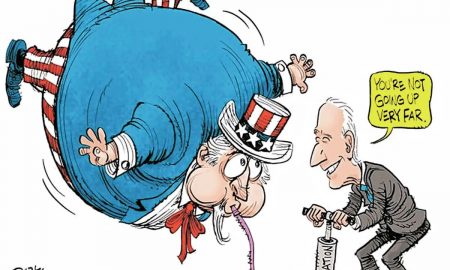
America is Rich But Americans Are Poor | This Best-Selling Book Explains Why

In the midst of America’s wealth and global dominance lies a startling and often overlooked reality: The persistent existence of poverty. Pulitzer prize-winning author Matthew Desmond, in his groundbreaking book “Poverty, by America,” confronts this issue head-on. He brings to light a disturbing fact: For over half a century, around 21% of Americans have languished in poverty.
In this article, we will explore the complexities of poverty in a nation renowned for its riches.

IA / Unsplash / Despite being one of the richest countries in the world, America still has over 21% poverty rate.
The Deep-Rooted Causes of American Poverty
Desmond’s exploration into American poverty unveils a series of interlinked causes contributing to this enduring issue. These include economic disparities, where a significant wealth gap has led to a concentration of riches in the hands of a few, leaving a large segment of the population struggling.
Likewise, racial inequalities also play a crucial role, with minority communities disproportionately affected by poverty—a consequence of systemic racial discrimination. Additionally, educational inequities further entrench poverty, especially in underfunded schools in impoverished areas, hindering opportunities for upward mobility.
The Impact of Government Policies
Desmond critically examines the role of government policies in either mitigating or exacerbating poverty. He points out that while welfare programs are designed to offer support, they often come with convoluted requirements and can discourage individuals from improving their situations due to the fear of losing benefits.

Pixabay / Pexels / According to Desmond, the American system is designed in a way that is not hyper-active in eliminating poverty through and through.
Moreover, the lack of a comprehensive healthcare system in the U.S. places an undue financial burden on low-income families, pushing them further into poverty.
The Cultural Dimensions of Poverty
In his book, Desmond also delves into the cultural aspects of poverty in America. He challenges the societal narrative that often attributes poverty to individual failings, ignoring the systemic barriers in place. The prevalent belief in self-made success overlooks the structural challenges many Americans face in escaping poverty.
A unique aspect of Desmond’s approach is his call for readers to become “poverty abolitionists.” He urges a shift from mere awareness to active participation in eradicating poverty. This involves challenging the existing systems and policies that perpetuate poverty and advocating for equitable and just solutions.
Pathways Out of Poverty
Despite the grim realities, Desmond offers a message of hope and outlines potential pathways for alleviating poverty. This includes advocating for policy reforms that make welfare, tax, and healthcare systems more equitable. Investing in education and ensuring equal access to quality schooling is also pivotal in breaking the poverty cycle.

Karolina / Pexels / To abolish poverty, Matthew Desmond wants his readers to be “poverty abolitionists” and play their individual roles in eliminating poverty from the country.
Plus, he emphasizes the importance of community engagement and grassroots initiatives in providing support and resources to those in need.
A Call for Collective Responsibility From a Pulitzer Prize-Winning Author
“Poverty, by America” is more than just an analysis of the poverty problem in the United States. It is a clarion call for action. Desmond implores us to rethink our approach to poverty, highlighting the need for systemic change and a collective commitment to solving this issue.
The book reminds us that while poverty is a complex problem, the solutions are within reach. If society, as a whole, commits to becoming poverty abolitionists and working towards a more equitable and just nation.
More in Lifestyle
-
`
What Must an Entrepreneur Do After Creating a Business Plan? Here’s a Step-By-Step Guide
Many successful entrepreneurs start with a solid business plan detailing the factors of their business, such as marketing, funding, legal considerations,...
June 2, 2024 -
`
Barbie Movies Are Outperforming Other U.S. Movies in China – Here’s Why
The Barbie movie is a huge hit in China! While lots of American movies usually do not do so well there,...
April 26, 2024 -
`
Hollywood Greatest Comebacks: Actors Who Staged Remarkable Returns
Hollywood may sparkle with glitz and glamor, but it’s a tough business. Stars who once basked in the spotlight can find...
April 26, 2024 -
`
Misinformation Is the New Normal: How You Can Spot Misinformation Online
In the ever-evolving world of the Internet, where information and misinformation intertwine like vines, it is essential to know how to...
April 25, 2024 -
`
What They Don’t Teach You in School About Money
From an early age, we’re told that going to school and getting a degree will set us up for financial success....
April 24, 2024 -
`
Work Presentations: How to Say Goodbye to Boring Office Meetings
Picture this: you’re in a conference room, surrounded by colleagues. The lights dim, a projector flickers to life, and there they...
April 24, 2024 -
`
Essential Documents for Opening a Business Bank Account: Your Checklist
Embarking on the entrepreneurial journey is exhilarating, but navigating the financial side of your venture requires thoughtful consideration. One pivotal step...
April 23, 2024 -
`
Gwyneth Paltrow Was Once Called out by NASA for This Bizarre Reason!
Once upon a time, Gwyneth Paltrow was considered to be one of the most promising actresses of her time. While she...
April 23, 2024 -
`
Discover the Royal Charm of Villa Maria Pia in Cascais, Portugal
Nestled on the sun-kissed north shore of Lisbon, the captivating town of Cascais, Portugal, harbors a secret steeped in royal history....
April 22, 2024















You must be logged in to post a comment Login